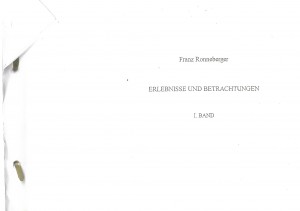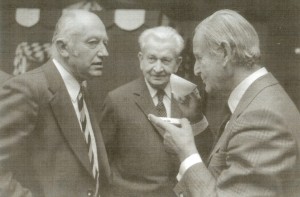Franz Ronneberger
From 1913 to 1999
Franz (Karl Konrad) Ronneberger was a German lawyer, political scientist and communication scientist. He was born on 15 March 1913 in Auma (Thuringia) and died on 30 March 1999 in Nuremberg (Bavaria). He has made great contributions to the content and structural development of communication science in Germany; he also provided important and early impulses for German-speaking PR research. However, Ronneberger is also considered morally and ideologically burdened by his work for the political and military system of National Socialism.
Two quotations are intended to facilitate the introduction to the biography of Franz Ronneberger:
Southeastern Europe is not an area which contains the prerequisites for its own self-contained order, but whose entire strength and significance lies in supplementing a larger order stabilised by the German Empire.
SS-storm trooper Franz Karl Konrad Ronneberger (National Socialist German Workers’ Party), chief of the intelligence service of the “Southeast European Society” (SES), 1941.
And:
PR is what PR does. In a nutshell. It can’t be defined any further. […] PR is an attempt to advertise trust, wherever trust is needed in our pluralistic society, in order to create any possibility that the many interests that meet in such a society can get along reasonably with each other.
Prof. Dr. Franz Ronneberger, University of Erlangen-Nuremberg, Austrian Broadcasting Corporation Night Studio, 1992.
Social Breaks and Biographical Change
Between these two quotations stand 50 years in the life of Franz Ronneberger: a man who developed from a son of a Thuringian craftsman to a sought-after news procurer and National Socialist spy in “Southeastern Europe” and who, after the Second World War, rose like a phoenix from the ashes to become a respected communication scientist and university professor. Franz Ronneberger’s biography is full of changes and contradictions, to the clarification of which he himself contributed only conditionally.1 Nevertheless, a critical-political examination of his person is also necessary and has already partly taken place in the specialist literature (cf. Duchkowitsch/Hausjell/Semrad 2004 and Heinelt 2003, pp. 130-188), as he is considered by many to be a founder of scientific PR and a pioneer of modern communication science in the old Federal Republic of Germany (among others Junghänel 2001).2
Abb.: Franz Ronneberger, Carl Hundhausen und Albert Oeckl (v.l.n.r.) bei einer Tagung der Deutschen Public Relations Gesellschaft in Frankfurt/Main, Hotel Intercontinental, Mai 1976. Quelle: Privat-Archiv Prof. Dr. Manfred Rühl, Nürnberg.
Along with Albert Oeckl and Carl Hundhausen, Franz Ronneberger is thus one of the outstanding PR personalities in 20th century Germany. They were similarly affected biographically by the socio-political ruptures of the century, although there were also differences between them. Before 1945, Ronneberger did not belong to the economic elite like Hundhausen or Oeckl, but to the political and academic elite (Heinelt 2003, p. 192). After 1945, Ronneberger’s PR views embodied a much higher degree of scientificness than that of Albert Oeckl, and to some extent also than that of Carl Hundhausen, whereby the latter in particular found a suitable partner in Ronneberger for his efforts to academise PR industry.
Annotations
1 Since the seventies, however, Ronneberger has written about 500 pages of “Erlebnisse und Betrachtungen” (Experiences and Reflections) for a smaller circle (family members, friends, doctoral students) – as a kind of autobiography – in which he describes his life, including his career years during the time of National Socialism and also his relations to National Socialism in detail. This autobiography, which he deliberately did not publish, was made accessible to this small circle in 1989 – when Ronneberger was 73 years old. The manuscript (quoted as Ronneberger 1989) was made accessible to me (Günter Bentele = G.BE.) by Manfred Rühl many years ago, after Ronneberger’s death, and is not used in previous critical publications on Ronneberger. It should also be used for future research, because it not only addresses but also clarifies some questions that are sometimes difficult to understand for those who were born after 1945, i.e. who do not know the political system of National Socialism from their own experience.

Abb.: Titelblatt der nicht publizierten Autobiographie: Ronneberger, Franz (1989): Erlebnisse und Betrachtungen, Band I und II (insgesamt 514 Seiten). Nürnberg: unveröffentlichtes, maschinenschriftliches Manuskript.
2 Wolfgang Langenbucher, an important representative of German communication science, especially of the seventies, eighties and nineties of the 20th century, called Ronneberger a “chameleon” and indeed “meant quite positively”. “He was the driving force behind innovation in the field like no other of his generation.” “He was the first to receive Niklas Luhmann.” In: Duchkowitsch/Hausjell/Semrad 2004, pp. 33 and 31. Manfred Rühl in the volume “Kommunikationswissenschaft autobiographisch” (Kutsch/Pöttker 1997) characterized him very aptly as “Wegmeister einer interdisziplinären Kommunikationswissenschaft” (cf. Ronneberger 1997).
Bildnachweis Beitragsfoto (ganz oben): Franz Ronneberger. Quelle: privat.



